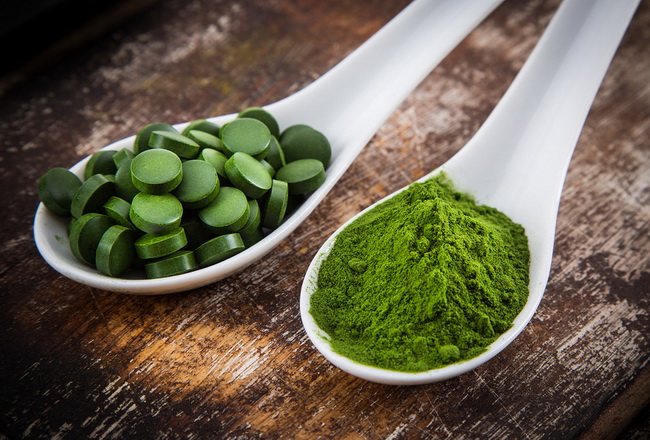- Make It Yourself Lavender Heart-Shaped Bath Bombs!
- 20 Things You Never Knew About “Down There”
- 12 Best Foods For Those Suffering From Arthritis Pain
- 12 Personal Hygiene Mistakes Almost Everyone Makes (Mom Never Told You About #4!)
- 15 Medicinal Plants And Herbs From The Cherokee People
- 12 Mind-Blowing Benefits Of Drinking Coconut Water During Pregnancy
- 12 Outstanding Winter Foods That Won’t Fatten You Up Like A Christmas Turkey
12 Proven Health Benefits of Spirulina (#7 is Nothing Short of Outrageous!)

Photo credit: bigstock.com
7. Help for Those with HIV/AIDS
It’s interesting to note that people in Japan, Chad, and Korea have very low rates of HIV/AIDS. Up until recently, this has been a mystery, but scientists believe that they might have the answer. A 2012 study, published in the Journal of Applied Phycology, involved 11 HIV subjects who had never taken antiretroviral. This group was split into three, with one part given 5 grams of brown seaweed each day, the second group 5 grams of spirulina, and the third group consumed both. After the three-month study period, the CD4 cells (which are the T-helper cells that fight infection and are used to stage HIV) and the HIV viral load cells remained stable. Researchers were surprised to see that there were absolutely no side effects whatsoever from those who consumed the seaweed or the combination. In fact, the subjects said that they felt so much better that they agreed to continue consuming the spirulina and seaweed for an additional 10-month period.
8. Improves Seasonal Allergies
Allergic rhinitis is what your doctor will call seasonal allergies, which are triggered by pollen, dust, and other environmental factors such as animal hair or wheat dust. To help stop these types of allergies, many people take spirulina. In a study conducted at the University Medical Faculty in Turkey, 127 subjects who suffered from these types of allergies consumed 2 grams of spirulina each day. At the end of the study period, results showed that those who consumed the spirulina experienced significant relief from all symptoms of allergic rhinitis, such as sneezing, nasal congestion, and itchy, watery eyes, when compared to the placebo group.
9. Speeds Up Weight Loss Efforts
When you consume spirulina, it takes more energy to metabolize this protein, which can help you burn fat and maintain muscle mass. Spirulina is also said to curb the appetite and appears to work best for those who are trying to lose weight rather than maintain it. To get the most from spirulina, try consuming it either in the morning or at midday.
10. Removes Heavy Metals
Chronic arsenic toxicity is a problem all over the world. Many people in the US appear to have no knowledge that inorganic arsenic is naturally present at high levels in our water and food supply. Spirulina is used in many countries, such as Bangladesh, to help stop arsenic poisoning. Spirulina helps to remove heavy metals from the body and appears to be particularly effective against arsenic. One study found that subjects who consumed a mere 250 mgs of spirulina had a 47 percent decrease in the amount of arsenic in their bodies when compared to the placebo group.
11. Protects the Liver
Studies done involving lab animals have shown that spirulina can offer some powerful protection for the liver. This is due to its high antioxidant compounds and its ability to synthesize nitric oxide. When compared in studies to the top antioxidant foods, spinach and blueberries, spirulina had the largest neuroprotective effect. This is believed to be due to spirulina’s anti-inflammatory compounds and its unequaled ability to stop free radicals.
12. Super Rich in Protein
When you consider that red meat is about 27 percent protein, it’s easy to see why people get excited about spirulina’s 50 to 70 percent protein levels. It is almost a complete protein, containing all of the essential amino acids and 10 of the 12 non-essential amino acids.
Is it any wonder that spirulina truly deserves the title of “super food”?
RELATED: 12 Unbelievable Reasons to Consume Spirulina (#4 is Awesome!)
Please note that pregnant women should not consume spirulina, and that others have experienced discomfort, such as headaches, thirst, rapid heartbeat, nausea, vomiting, and general stomach pain, from consuming this type of algae.
If you are consuming any prescription medications, if you are under a doctor’s care for any type of health condition, or if you are just not sure if spirulina is for you, please consult with your doctor before consuming this supplement.
You should also start off slowly, taking small amounts and then gradually adding more to see how your body adjusts to spirulina.
Always choose spirulina from quality sources, preferably from Hawaii. Spirulina from Japan used to be the best quality, but since the Fukushima disaster, which has yet to be contained, it is suggested that you avoid this product for the time being.
References:
































